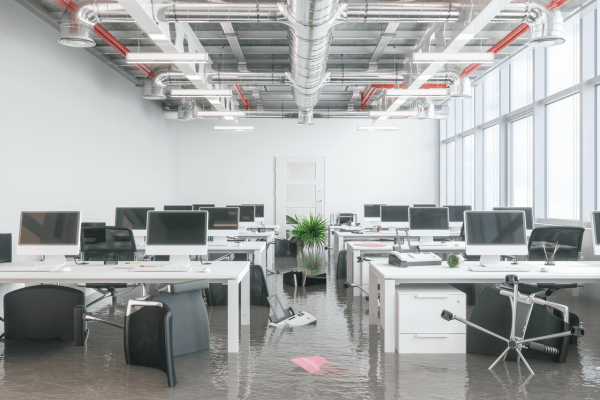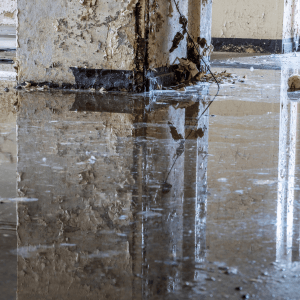
You arrive at your office early one morning, ready to start the day, only to be greeted by an ominous sound—water dripping. A pool of water is spreading across the floor, trickling down the walls, and soaking everything in its path. Whether it’s caused by a burst pipe, a leaky roof, or a malfunctioning appliance, commercial water damage is a business owner’s worst nightmare. It can happen in any type of business, from office buildings to retail stores, leaving behind a trail of destruction that disrupts operations and impacts your bottom line.
Commercial water damage is more common than you might think, which is why it’s crucial to understand the potential sources of water damage, the risks involved, and how to protect your business. By being informed and prepared, you can minimize downtime, reduce repair costs, and ensure that your business recovers quickly.
Common Sources of Commercial Water Damage

Water damage in commercial buildings can stem from various sources. Here’s a look at some of the most common culprits:
Plumbing Failures: Broken pipes, faulty fixtures, and sewage backups are among the leading causes of water damage. A burst pipe can release hundreds of gallons of water in just a few hours, flooding entire sections of a building and causing extensive damage.
Roof Leaks: Poor maintenance, storm damage, and aging materials can lead to leaks in the roof. Over time, even a small leak can lead to significant water damage, compromising the structural integrity of the building.
HVAC System Issues: HVAC systems are vital for maintaining a comfortable environment, but they can also be a source of property damage. Clogged drains, leaking ducts, and condensation buildup can lead to water seeping into walls, floors, and ceilings.
Appliance Malfunctions: Commercial kitchens and laundries rely on appliances like water heaters, dishwashers, and washing machines. When these appliances malfunction, they can cause significant water damage, particularly if the problem goes unnoticed for a long time.
Natural Disasters: Flooding from heavy rains, hurricanes, and other severe weather conditions is a major cause of water damage. In areas prone to these types of events, businesses must be particularly vigilant and have a robust disaster preparedness plan in place.
How Water Damage Can Negatively Impact a Business
The impact of water damage on a business can be far-reaching, affecting not just the physical space but also the company’s operations, finances, and reputation.
Financial Losses: Water damage can lead to direct costs, such as repairs and replacement of damaged goods, as well as indirect costs like loss of revenue due to business interruption. Depending on the severity of the damage, the financial toll can be devastating.
Health Risks: Water damage often leads to mold growth, which can compromise indoor air quality and pose health risks to employees and customers. Mold exposure can cause respiratory issues, allergies, and other health problems, leading to potential liability issues for the business.
Structural Damage: Long-term exposure to water can weaken the structure of a commercial building, leading to deterioration of walls, floors, and ceilings. Over time, this can result in costly repairs and, in severe cases, make the building unsafe for occupancy.
Legal and Liability Issues: If a business fails to address water damage promptly, it could face lawsuits from tenants, customers, or employees. Proper maintenance and timely repairs are essential to avoid legal complications and protect the business’s reputation.
5. Who is Responsible for Water Damage in a Leased Commercial Property?

Determining responsibility for water damage in a leased commercial property can be complex. Here’s a general overview:
Landlord vs. Tenant Responsibilities: Typically, the lease agreement will outline who is responsible for repairs in the event of water damage. In most cases, the landlord is responsible for structural repairs, while the tenant is responsible for damages to their property and any improvements they’ve made to the space.
Insurance Considerations: Both landlords and tenants should have insurance that covers water damage. Landlords typically carry commercial property insurance, which covers damage to the building, while tenants may need commercial renters insurance to cover their own losses.
Read these blog post on Raizner Law Blog for more information:
- laws on commercial property damage in Texas
- Who is responsible for water damage in a leased commercial property
Answering Common Questions
Does Commercial Renters Insurance Cover Water Damage?
Yes, commercial renters insurance generally covers water damage to the tenant’s property, but it’s important to check the specific terms of the policy. Not all types of water damage may be covered, particularly if the damage results from negligence.
How Does Insurance Work for Water Damage?
Insurance coverage for water damage typically involves assessing the cause of the damage, determining responsibility, and filing a claim. Both landlords and tenants should understand their policies and know how to document damage for a claim.
What is Property Damage Commercial Insurance?
Property damage commercial insurance is a policy that covers damage to the building itself. This can include water damage, fire, vandalism, and other perils. Landlords typically carry this insurance to protect their investment.
Is Water Damage Considered Structural?
Water damage can be considered structural if it affects the building’s foundation, walls, or other critical components. Structural damage is usually more severe and costly to repair, and it may also pose safety hazards.
Importance of Adequate Insurance Coverage
Having adequate insurance coverage is essential for protecting your business from the financial fallout of water damage. Here’s what you need to know:
Understanding Your Policy: Review your insurance policy carefully to understand what is and isn’t covered. Look for key elements related to water damage, such as coverage limits, exclusions, and deductibles.
Preventative Measures: Taking steps to prevent water damage can not only protect your property but also reduce your insurance premiums. Regular maintenance, prompt repairs, and disaster preparedness are all important.
Resource: For more information, visit the Texas commercial property insurance guide.
Conclusion
Commercial water damage is a serious issue that requires prompt attention and careful planning. By understanding the risks, taking preventative measures, and ensuring you have the right insurance coverage, you can protect your business from the worst consequences. If you ever find yourself dealing with water damage, don’t hesitate to contact Complete Flood Restoration. We’re here to help you navigate the process and get your business back on track as quickly as possible.
